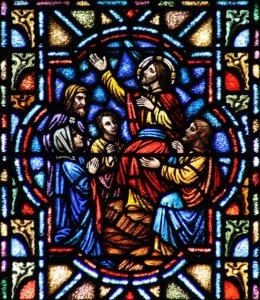
Homily: 24th Sunday after Pentecost (Year A) – Proper 28
Lord, you have been our refuge,
From one generation to another.
Before the mountains were brought forth,
Or the land and earth were born,
From age to age you are God.
So teach us to number our days
That we may apply our hearts to wisdom.[1]
Stories
Early childhood learning is the foundation of wisdom in life. So often that comes through stories we hear as children. My wife loved stories. She loved to read stories. She loved to write stories. She read stories to her children and made them lovers of stories. Amongst the many notes she kept in her purse were the concluding words of the poem from Strickland Gillilan: “You may have tangible wealth untold; caskets of jewels and coffers of gold. Richer than I you can never be. I had a mother who read to me.”[2]
 We can never know whether mother Mary told stories to the young Jesus. Yet we do know that Jesus loved stories. Stories were central to Jesus’ ministry. During these final weeks of Pentecost, Jesus tells stories that disclose the path to the Kingdom of heaven. Yet we must be wise enough to interpret them. In his Sermon on the Mount, Jesus reveals the life of the Kingdom of heaven to large crowds.[3] In his parable of the vineyard we discover that the path to the Kingdom is revealed through personal resurrection. In his example of the coin Jesus reminds us that obligation to civil authority, to Caesar, neither conflicts with, nor relieves us from the command to love our God with heart, soul and mind; and to love our neighbor as ourselves. Last week, in the example of the ten bridesmaids we are called to a life of preparedness. We do not know the day, nor the hour when the Lord will come, like a thief in the night. So be prepared.
We can never know whether mother Mary told stories to the young Jesus. Yet we do know that Jesus loved stories. Stories were central to Jesus’ ministry. During these final weeks of Pentecost, Jesus tells stories that disclose the path to the Kingdom of heaven. Yet we must be wise enough to interpret them. In his Sermon on the Mount, Jesus reveals the life of the Kingdom of heaven to large crowds.[3] In his parable of the vineyard we discover that the path to the Kingdom is revealed through personal resurrection. In his example of the coin Jesus reminds us that obligation to civil authority, to Caesar, neither conflicts with, nor relieves us from the command to love our God with heart, soul and mind; and to love our neighbor as ourselves. Last week, in the example of the ten bridesmaids we are called to a life of preparedness. We do not know the day, nor the hour when the Lord will come, like a thief in the night. So be prepared.
These stories inform us that faith is the key to preparedness. Faith in our God. Faith in ourselves. The New Testament landscape is filled with examples of salvation through faith. Mary, mother of Christ accepts the call from Gabriel entirely on faith. The faith of the friends who lower the cripple through the roof to receive the healing power of Jesus. The faith of the woman who knew she would be healed if only she could touch the hem of Jesus’ robe. The faith of the penitent thief on the cross who rises to join Jesus in the Kingdom of heaven. These are examples of faith in action.
The Little Engine Who Could
Step back with me to our childhood and the story of The Little Engine Who Could.[4] Remember how the story begins? There is a train full of Christmas toys, presents and holiday delights, destined for the children who live on the other side of the mountain. The train sets off on gaily on its journey. As it approaches the steep mountain climb ahead, the little locomotive breaks down. What a disaster! They must overcome the challenging climb ahead if the children on the other side are to receive their presents in time for Christmas.
The little engine pleads with passing engines to hook up and carry the load over the mountain. None will help. The Shiny New Engine is too fine for such work. The powerful Freight Engine is too important. The Rusty Old Engine is too tired. And then, out of the yard the Little Blue Engine comes chugging along.
 “Please, please help us” cry the dolls and toys. “Oh, dear,” she says. “I’m not very big and have never been over the mountain,” says the Little Blue Engine. She is only a small engine, called to shuttle railroad cars around the yard. She has never been called upon for such a big job. Moved by the tears in the doll’s eyes, the Little Blue Engine says, “well…I think I can, I think I can, I think I can.” So the Little Blue Engine hooks up and off they go. Up and up the mountain they go, slowly at first, then faster and faster. “I think I can, I think I can, I think I can,” she puffs…and… they reach the top of the mountain. Then down they go, into the valley as the Little Blue Engine says: “I thought I could, I thought I could, I thought I could.”
“Please, please help us” cry the dolls and toys. “Oh, dear,” she says. “I’m not very big and have never been over the mountain,” says the Little Blue Engine. She is only a small engine, called to shuttle railroad cars around the yard. She has never been called upon for such a big job. Moved by the tears in the doll’s eyes, the Little Blue Engine says, “well…I think I can, I think I can, I think I can.” So the Little Blue Engine hooks up and off they go. Up and up the mountain they go, slowly at first, then faster and faster. “I think I can, I think I can, I think I can,” she puffs…and… they reach the top of the mountain. Then down they go, into the valley as the Little Blue Engine says: “I thought I could, I thought I could, I thought I could.”
Jesus sends us his message in parables. The message is hidden within the story, there for us to discover. That, of course, is the purpose. Through living within the story, we awaken the message inside ourselves. The meaning within the The Little Engine that Could is clear. It is a life example of faith in action. Not so obvious is the meaning within Matthew’s parable of the talents.
Parable of the Talents
 A wealthy master prepares for a journey. He entrusts a great deal of property to his servants, in portions according to their ability. The value of a single talent he entrusts is huge. It is equivalent to the income of half a lifetime in biblical times.[5] The point is, however, the master entrusts his servants with huge amounts. One servant receives five talents, a second receives two, the third receives one. After a very long time, the master returns to settle accounts. The first two servants make a good report, they have invested their portions to outstanding results. They have doubled the master’s investment in them. “Well done, good and trustworthy servant, enter into the joy of your master.”
A wealthy master prepares for a journey. He entrusts a great deal of property to his servants, in portions according to their ability. The value of a single talent he entrusts is huge. It is equivalent to the income of half a lifetime in biblical times.[5] The point is, however, the master entrusts his servants with huge amounts. One servant receives five talents, a second receives two, the third receives one. After a very long time, the master returns to settle accounts. The first two servants make a good report, they have invested their portions to outstanding results. They have doubled the master’s investment in them. “Well done, good and trustworthy servant, enter into the joy of your master.”
The third servant has a very different report. “Master, I knew you were a harsh man. So I hid my talent in the ground, for fear of losing it in the market. Here, I return to you what is yours.” To which the master replies, “You wicked and lazy slave; you should have placed my investment with the bankers, which would have gained at least some interest.” The master reclaims the single talent and gives it to a servant who has proven it will be put to proper use. “For those who have, more will be given; for those who have nothing, even what they have shall be taken away. Those who have nothing will be thrown into outer darkness, where there will be weeping and gnashing of teeth.”
I pause for a moment on the colorful image that “weeping and gnashing of teeth” conveys. It appears only seven times in the Bible, six of which are in Matthew’s gospel. The phrase describes the desolation of those who are turned away from the presence of God.[6] The third servant is banished from the presence of the master. All that he had…not just that single talent…is taken away.
In our ‘nine to five’ world we are conditioned to interpret the message as a call to make proper use of our talents. Even the word ‘talent’ implies the natural gift of our ability. After all, the master apportions his wealth to each according to their ability. The ones who do well deserve advancement. They receive a larger office, an executive assistant, an expense account. They are on the partnership track in their investment firm. They will be put in charge of many more things. The third servant better get his resume out tomorrow. We worry about the servant’s future. It’s not going to be on Wall Street.
Acting in Faith
That’s the way we might read the parable in our world. It is an affirmation of our Western work ethic. You work hard, you get results, you are successful. How interesting it is that historical context flips interpretation on its ear. Stepping back into a 4th century telling of this parable, the third servant is the hero. In that age, burying the deposit absolves the trustee from any loss. In that age, seeking interest is forbidden by the Torah. The third servant senses he is about to be a pawn in the investment scheme of a greedy master, the Gordon Gekko of his age…one who gathers where he does not sow. Refusing to support the master’s avarice, the third servant becomes the hero in a different culture.[7] A fourth century whistleblower?
But is the message really about the proper accounting of a commercial enterprise? Do we really think that God tracks our readiness to enter the Kingdom of heaven on the basis of generally accepted accounting principles? I think not. Let me offer a very different insight into our parable, offered by the noted commentator Robert Capon.[8]
Like the Little Engine, this is a story of faith in action contrasted with an example of lack of faith. God gives God’s servants a great bounty, the gracious gift of love. It is the gift of a lifetime. God establishes a fiduciary relationship with us, that is f-i-d, as in fides, in Latin. Faith, trusting. The frightened servant acts out of prudence, not out of faith. The servant acts out of who he thinks God is, not of what we trust God to be.[9] God tells us: when I give you a gift of grace, I expect you to do something with it. All that matters is that you play. Not that you play well or badly, but that you play. The reward he offers to those who do play: “Well done, good and faithful servant…enter into the joy of your master.” Such is the reward of dedicated and fruitful response to God’s gift in and through Jesus.[10]
God calls us to faith, faith in ourselves to come into the joy of our master. It is through faith that we overcome the obstacles in life. “I think I can, I think I can” carries us up the mountain and onward to our destination. The message of the parable is that we reach the Kingdom of heaven through faith in the bountiful gift of grace we receive from Jesus.[11]
Works Referenced:
This is a homily delivered to a congregation at Emmanuel Church, Newport RI on Sunday, November 15, 2020. I am indebted to the following for their insights into the lectionary for the day: R.T. France, The Gospel of Matthew, Eerdmans, 2007; Robert Farrar Capon, Kingdom, Grace, Judgment, Eerdmans, 2002; and Raymond E. Brown, An Introduction to the New Testament, Yale University Press, 2010
Roger C. Bullard, November 15, 2020
[1] Psalm 90, 1,2,12
[2] Strickland Gillilan (1869-1954), The Reading Mother, public domain.
[3] R.T. France, The Gospel of Matthew, Eerdmans, 2007, p.153
[4] Watty Piper, The Little Engine That Could, Platt & Munk, Publishers, New York, 1930
[5] op.cit, France, p. 953
[6] Matt 8:12, 13:42, 13:50, 22:13, 24:51, 25:30 (also Lk 13:28, Ps 35:16)
[7] Richard L. Rohrbaugh, “Biblical Views: Reading the Bible Through Ancient Eyes,” Biblical Archaeology Review 42.5 (2016): 22, 62. Comments on the parable as quoted by Eusebius (265-339 CE)
[8] Robert Farrar Capon, Kingdom, Grace, Judgment, Eerdmans (2002),
[9] op.cit, Capon, p 421,422
[10] Raymond E. Brown, An Introduction to the New Testament, Yale University Press, 2010, p.199
[11] op.cit, Capon, p 424
